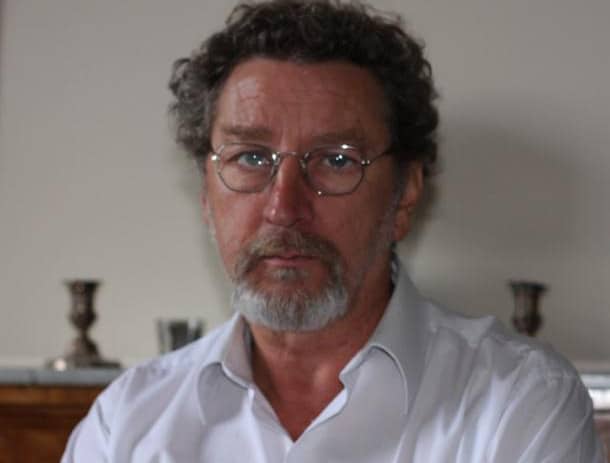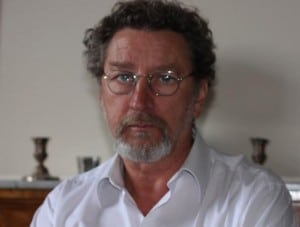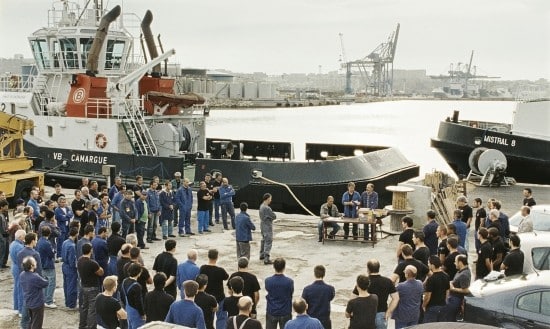
We met Robert Guédiguian at the private apartments at the French Institute in South Kensington to talk about his latest film “Snows of Kilimanjaro” starring Jean-Pierre Darroussin and Ariane Ascaride. French portraits and provençal décor seemed a fitting background for our discussion. With his kind face and tousled hair Robert comes across as a sympathetic and relaxed person who has totally mastered his craft over the past three decades and speaks softly but with conviction in a Southern French accent. Born to a German mother and Armenian father in L’Estaque, the new port of Marseilles, he’s chosen to make his birth town a character in many of the 17 films in his directorial repertoire that started in 1981. His work has also taken him back to his father’s roots for Journey to Armenia (2006) and to Paris for his excellent poitical study, The Last Mitterand (2005) and his dazzling historical drama, Army of Crime (2009) that celebrates the resistance fighters in wartime Paris and reflects his commitment to France’s mutlicultural background.
 F: I read the Victor Hugo poem, The Poor People, that gave you inspiration for Snows of Kilimanjaro. My understanding is that the story is of a fisherman away in all weathers who returns to find his wife and five children well, but their neighbour dead and her children orphaned. I understand the point, that those that work the sea are part of a brotherhood- a family, but how did you get from that story to this?
F: I read the Victor Hugo poem, The Poor People, that gave you inspiration for Snows of Kilimanjaro. My understanding is that the story is of a fisherman away in all weathers who returns to find his wife and five children well, but their neighbour dead and her children orphaned. I understand the point, that those that work the sea are part of a brotherhood- a family, but how did you get from that story to this?
RG. I wanted only the same end to Snows as the poem, along with the poem’s social background and working the sea. That and the fact that it is a love-story. That was my starting point and the rest came from there.
F. Marseilles is obviously close to your heart and plays a character in the finished film in many of your films. Would you care to expand on that?
RG Marseilles is an exceptional theatre; young people from around the world are there and, unlike London or Paris, as a Mediterranean port, it has been multicultural for many centuries, not just a few, a great melting pot and I find this very interesting. What is extremely important is where you film – it’s what gives character, a certain character, a câchet. Where you shoot your location gives the film a visual identity, its life and colour. Yes, you could transfer the story to say Liverpool, but Marseilles has its own very particular look and feel.
F. I understand your father worked the docks… How much of your father, if anything, is in the character of Michel and indeed your mother in Marie-Claire?
RG. Always all my movies are autobiographical to some extent, however, my story, my background is also then completely bent or deformed to fit the story that I have written, that I wish to tell, so there is effectively very little of my father or mother or me in this. Even though it of course remains ‘autobiographical’.
F. What does working with the same cast give you that a new cast doesn’t?
RG. It works rather like a theatre troupe doing a repertoire of plays. In the same way that Marseilles is a theatre for me, the cast and crew are a family; there are no limits as to what they will do. There will be no nasty surprises. They are like instruments in an orchestra, ready to go. I already have a whole set of instruments there. There is now of course also a shorthand in terms of understanding. But importantly, there are no egos; no one will put their own performance above the film, they will all serve the film first.
F. I felt a strong improvised element to some scenes… is this accurate?
RG. Not at all with the actors, but only with the young children, yes. There is no text or script for them; it’s just what they bring naturally.
F. The differing viewpoints of the various characters were very strong and felt genuine. How did you write or research these?
RG. I never research as such. But on the other hand, I research all of the time. By reading every day; reading the newspaper, trying to get information all of the time and talking to people. Also my own experience as a political animal and trade unionist.
F. How long did it take to write? How long to shoot?
RG. The skeleton of a story takes the time it takes, but the actual scene writing takes maybe a month and a half after that initial process of having all the thoughts fall into place. The filming itself took eight weeks.
F. Do you rehearse a lot with the actors prior to shooting? How many takes do you tend to use on average?
RG. I never rehearse. I like being surprised by the actors first response to a scene, their first reading. I like the first reactions and the spontaneity therein. I may then redirect in terms of how fast or slow something is said, or where the actors walk, etc. I will never take more than six takes. Any more than six and the scene isn’t working and needs rewriting.
F. Why did you feel strongly enough to make this film? Is it a sentiment you feel that is running through this generation; a n ignorance of the sacrifices and the battles of their forefathers?
RG. This conflict of generations exists not just in Marseilles, but worldwide. It is the “indignant” that this film represents: the people that are demonstrating outside the banks, and so on. There is a generation of “indignant” that I am putting into this story in Marseilles, rather than the other way around. It is a universal story that I have placed in Marseilles.
F. Did you hope to achieve anything beyond simple entertainment by making this film?
RG. Yes of course. Even filmmaking that is seen as just entertainment is by its very being political, whether the filmmaker knows or acknowledges it or not. Making a film is a political act.
F. Can you expand for me the importance to you of working not only with the same actors, but the same crew? I notice you re-use the same cinematographer/editor/production designer for many films….
RG. I like to work with the same crew for the same reason as I like to use the same actors. There will be no nasty surprises and they will put the film first. I will not have an issue with a cinematographer for instance, wanting to put his ‘style’ or print on the film, he will simply serve the film.
F. You have an Armenian and German heritage – I note the humorous dig at Germans in the film!. Did it have any bearing on your childhood? What does this bring to your filmmaking and your identity as a Frenchman, if anything? There is a strong element of ‘identity’ or ‘belonging’ in this film. 
RG. Growing up in L’Estaque, I never really felt to be an outsider as such. Sure, when I was very young a couple of times someone might have called me a ‘Bosch’ in derogatory fashion, but really, I felt I belonged to a very strong working class culture, encompassing many different cultures; as I grew up, my friends were Spanish, Italian, even Moroccan, but we were all brought together by this common, shared element over and above any other perceived differences.
I think what is both remarkable and sad, is a sense – not just in Marseilles – but worldwide- that this new generation does not have a solidarity, a ‘coming together and moving as one’ and therefore the collective power or sense of belonging that my generation had in order to get things done. Now it is all about the individual, but this brings with it a loneliness and this I explore in the family and circle of friends unit in the film and how supportive and nurturing it can be. I feel that has been lost to this generation; to its detriment.
F. What is next for you in terms of filmmaking?
RG. My next film, shooting next year and starring Ariane Ascaride is called ‘Au Fil d’Ariane’ a lighter film, again set in Marseilles, it is the character of Ariane that is going to be played with, the narrative concerns her character. This film is going to be like a holiday for me!
The Snows of Kilimanjaro is showing at the Cine Lumière downstairs from 14th September 2012. AT
This interview is subject to copyright ©